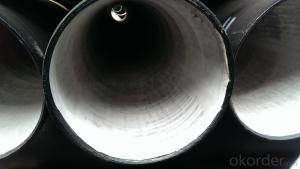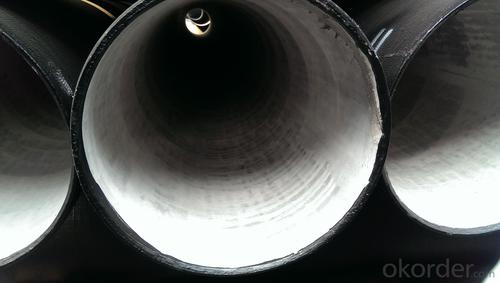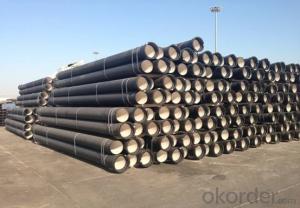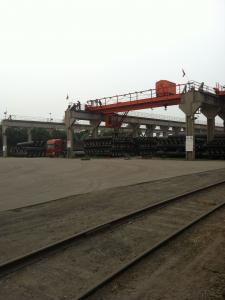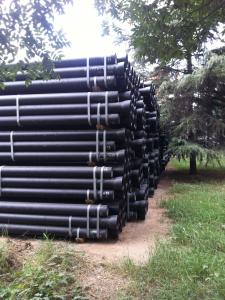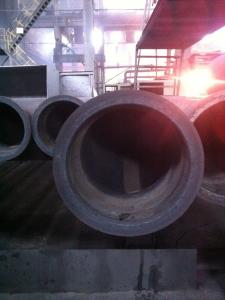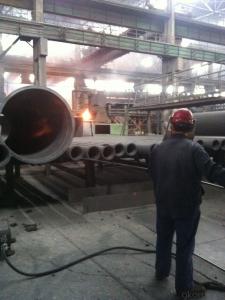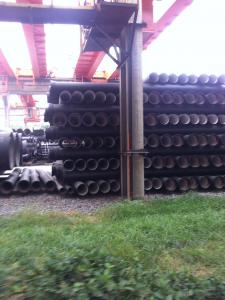DUCTILE IRON PIPES AND PIPE FITTINGS K9 CLASS DN1300
- Loading Port:
- Tianjin
- Payment Terms:
- TT OR LC
- Min Order Qty:
- 22 m.t
- Supply Capability:
- 30000 m.t/month
OKorder Service Pledge
OKorder Financial Service
You Might Also Like
Material : Ductile Cast Iron
Size Range : DN 80mm to DN 2000mm
Unit Effective Length : 6m or 5.7m
Manufacture Standard: ISO 2531:1998/ EN 545:2006/EN 598:2007
Annual capacity : 200,000 tons
Coating Exterior: Zinc 130g/m2 according to ISO 8179-1 and bitumen coating 70 microns.
Cement Interior: Portland Cement/ High Alumina Cement/ Sulphate Resisting Cement Lining according to ISO 4179
Special requirements on external coating and internal lining can be applied
We also provide accessories such as SBR/EPDM rubber gaskets, lubricant paste, pipe caps, PE sleeves, etc.
Additional Parts:
Each pipe is strictly inspected according to related standard to ensure permanently high performance.
Easy Installation at site and service free for life
Long Service Lifespan
Quotation will arrive you within 24hours once we get your inquiry.
We guarantee offering you a competitive price.
A copy of original inspection reports of pipes will be offered after shipment.
Photos of loading process will be sent to the customer after shipment effect.
We will follow-up the delivery progress after shipment effect and update to the customer on weekly basis.
- Q: Can ductile iron pipes be used for offshore oil and gas installations?
- Yes, ductile iron pipes can be used for offshore oil and gas installations. Ductile iron is a type of cast iron that offers excellent strength and durability, making it suitable for various applications including offshore environments. These pipes have high tensile strength and are resistant to corrosion, making them ideal for transporting oil and gas in harsh offshore conditions. Ductile iron pipes are often used for subsea pipelines, risers, and flowlines due to their ability to withstand high pressures and resist external forces such as waves, currents, and impacts. They are also capable of handling the high temperatures and pressures associated with offshore oil and gas production. Furthermore, ductile iron pipes have a long service life and require minimal maintenance, reducing the overall operating costs for offshore installations. They are also readily available and cost-effective compared to other materials such as steel. However, it is important to consider factors such as the specific requirements of the project, environmental conditions, and the compatibility of ductile iron with other materials used in the offshore installation. Proper engineering analysis and design considerations should be undertaken to ensure the suitability and safety of ductile iron pipes for offshore oil and gas installations.
- Q: Can ductile iron pipes be used for water distribution networks?
- Water distribution networks can utilize ductile iron pipes. Ductile iron, a type of cast iron known for its strength and flexibility, is well-suited for a variety of applications, including water distribution systems. Due to their durability, resistance to corrosion, and long lifespan, ductile iron pipes have been widely used in water supply networks. These pipes are capable of withstanding high pressure and are resistant to external loads and ground movement, making them an ideal choice for underground installations. Additionally, ductile iron pipes are commonly used for transporting safe drinking water as they are non-toxic and do not contaminate the water supply. Moreover, ductile iron pipes possess excellent hydraulic properties, ensuring efficient water flow and minimizing friction losses. Their smooth interior surface prevents the accumulation of deposits, reducing the risk of clogs and maintaining a consistent water flow. In summary, ductile iron pipes offer a reliable and effective solution for water distribution networks, guaranteeing the safe and efficient transportation of water to communities and industries.
- Q: How are ductile iron pipes protected against external soil loads?
- Ductile iron pipes are protected against external soil loads through a combination of proper installation techniques and the use of protective coatings. The pipes are installed in a manner that allows for adequate support and backfilling, which helps distribute the external soil loads evenly. Additionally, these pipes are often coated with materials such as epoxy or polyethylene to provide a barrier between the pipe and the surrounding soil, preventing corrosion and damage from external forces. This protective coating ensures the longevity and durability of ductile iron pipes in underground applications.
- Q: How do ductile iron pipes handle dynamic loads?
- Ductile iron pipes are known for their exceptional strength and durability, which allows them to effectively handle dynamic loads. These pipes have a high resistance to bending and can withstand the pressure and stress exerted on them when subjected to dynamic loads, such as water hammer or ground movement. The unique composition of ductile iron, which includes a small amount of carbon and the addition of magnesium, creates a structure that is both strong and flexible. This combination enables the pipes to flex under the impact of dynamic loads, rather than fracturing or breaking like other materials. Additionally, ductile iron pipes have a high impact resistance, which means they can absorb and distribute the energy generated by dynamic loads throughout their structure. This ability to dissipate energy helps to minimize the risk of pipe failure and ensures the longevity of the pipeline system. Furthermore, ductile iron pipes have excellent stress distribution properties, which means that the load applied to the pipes is evenly dispersed along their length. This helps to prevent localized stress concentrations and reduces the likelihood of damage or failure. In summary, ductile iron pipes are designed to handle dynamic loads efficiently. Their strength, flexibility, impact resistance, and stress distribution properties make them highly suitable for applications where dynamic loads are a concern, ensuring the reliability and longevity of the pipeline system.
- Q: Are ductile iron pipes resistant to hydrogen sulfide corrosion?
- Generally, ductile iron pipes exhibit resistance to hydrogen sulfide corrosion. Ductile iron, a form of cast iron treated with magnesium, results in a material that is both flexible and durable. This treatment considerably improves its resistance to corrosion, including corrosion caused by hydrogen sulfide. The magnesium within the ductile iron creates a protective layer on the surface, preventing the infiltration of hydrogen sulfide and other corrosive substances. Nonetheless, it is important to acknowledge that the resistance of ductile iron pipes to hydrogen sulfide corrosion can still be affected by factors such as the concentration and duration of exposure to the corrosive environment. Hence, it is crucial to implement proper maintenance, regular inspection, and appropriate protective measures to ensure the long-term durability and performance of ductile iron pipes in the presence of hydrogen sulfide.
- Q: Are ductile iron pipes suitable for sewer force mains?
- Sewer force mains can indeed make use of ductile iron pipes. Ductile iron, a variant of cast iron, possesses a higher degree of strength and flexibility in comparison to conventional cast iron pipes. This quality renders it suitable for applications where pipes must endure high pressure and heavy loads, such as sewer force mains. Ductile iron pipes exhibit exceptional resistance against corrosion and boast impressive durability, which proves vital for sewer systems that face exposure to various corrosive substances and challenging environments. Moreover, these pipes possess the ability to absorb vibrations and shocks, thereby reducing the risk of pipe failures caused by external forces. Furthermore, ductile iron pipes possess a renowned reputation for their lengthy service life, frequently extending beyond 100 years. As a result, they constitute a cost-effective choice for sewer force mains, necessitating minimal maintenance and replacement throughout their lifespan. In conclusion, ductile iron pipes offer a dependable and long-lasting solution for sewer force mains, delivering the requisite strength, flexibility, and resistance to corrosion to ensure the efficiency and durability of sewer systems.
- Q: What are the different types of joints available for ductile iron pipe?
- There are three main types of joints available for ductile iron pipe: push-on joints, mechanical joints, and restrained joints. Push-on joints use a rubber gasket that is compressed to create a watertight seal. Mechanical joints consist of a gland and a follower that are connected with bolts and nuts to create a leak-proof joint. Restrained joints are designed to withstand internal pressure and external forces through the use of a key and gland system.
- Q: Can ductile iron pipe be used for cooling water systems?
- Certainly, cooling water systems can utilize ductile iron pipe. With its exceptional corrosion resistance, remarkable tensile strength, and ability to withstand high-pressure scenarios, ductile iron pipe proves itself suitable for a range of applications, including cooling water systems. Its durability and versatility ensure the efficient transportation and distribution of cooling water, eliminating the likelihood of leakage or malfunction. Moreover, ductile iron pipe is renowned for its extended lifespan and minimal upkeep demands, rendering it an economically sound option for cooling water systems.
- Q: Which is good for water polo cast iron pipe steel pipe?
- The advantage of ductile iron pipe is cheap, corrosion resistance, lack of toughness is poor, not easy to process
- Q: How does ductile iron pipe perform in extreme weather conditions?
- Ductile iron pipes are renowned for their exceptional performance in adverse weather conditions. These pipes demonstrate remarkable durability, resistance, and flexibility, making them suitable for enduring harsh weather such as extreme temperatures, heavy rainfall, snowfall, and even earthquakes. One of the notable characteristics of ductile iron is its capacity to withstand damage caused by freezing temperatures. Unlike other materials, ductile iron pipes possess a low coefficient of thermal expansion, enabling them to resist the expansion and contraction that occurs during freeze-thaw cycles without experiencing cracks or breaks. Consequently, these pipes remain intact and continue to function optimally even in extremely cold conditions. Furthermore, ductile iron pipes exhibit excellent resistance to corrosion, rendering them highly resilient to the corrosive effects of severe weather. They are shielded by a sturdy zinc coating, which acts as a barrier against rust and other forms of corrosion. This coating, in conjunction with the inherent strength of ductile iron, grants these pipes exceptional resistance to the corrosive effects of rain, snow, and moisture. Moreover, ductile iron pipes possess superior flexibility, allowing them to accommodate ground movement and seismic activity. In areas prone to earthquakes or soil shifting, these pipes can absorb stress and strain without fracturing, guaranteeing a continuous supply of water and sewage services even in the most challenging weather conditions. Overall, ductile iron pipes excel in extreme weather conditions due to their durability, resistance to freezing, corrosion, and flexibility. Their ability to withstand the elements ensures an uninterrupted supply of water and sewage systems, providing reliability and peace of mind to utility providers and communities, even in the most unforgiving environments.
Send your message to us
DUCTILE IRON PIPES AND PIPE FITTINGS K9 CLASS DN1300
- Loading Port:
- Tianjin
- Payment Terms:
- TT OR LC
- Min Order Qty:
- 22 m.t
- Supply Capability:
- 30000 m.t/month
OKorder Service Pledge
OKorder Financial Service
Similar products
Hot products
Hot Searches
Related keywords
